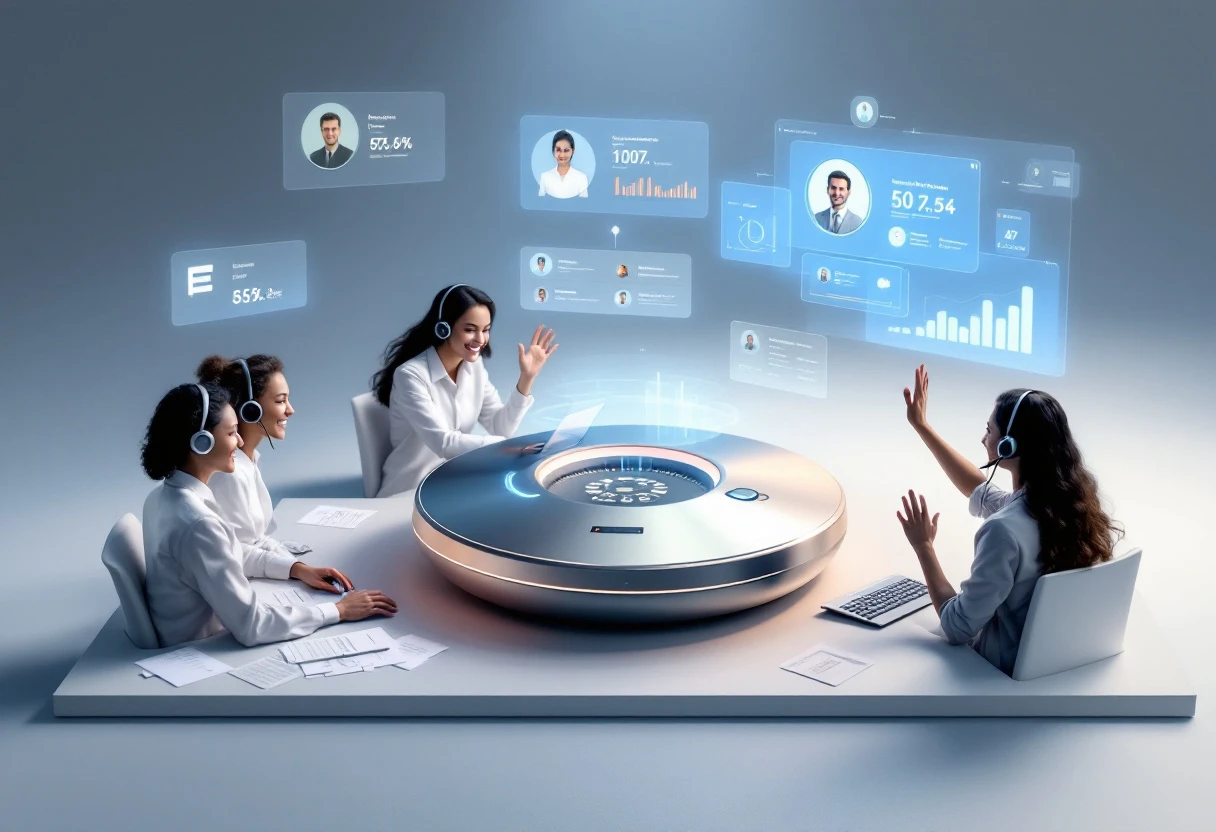
Are you looking to elevate your customer service experience while adapting to changing business needs? A scalable business phone system can provide you with the responsive communication tools necessary to meet customer demands. By integrating advanced technology, your business can enhance efficiency, manage high call volumes, and improve overall customer satisfaction. Discover how embracing these scalable solutions can transform your customer interactions and prepare you for future growth.
Many businesses still rely on traditional phone systems, which can lead to frustrating limitations. For instance, call congestion is a common issue, especially during peak hours. When lines are busy, customers may hang up, missing out on potential sales opportunities and leaving businesses with unsatisfied clients. This is particularly detrimental in industries like retail, where responsiveness can significantly impact customer loyalty and sales.
Additionally, traditional systems often lack integration with modern software solutions, leading to a fragmented communication approach. Without a cohesive system, customer data remains scattered, making it difficult for teams to provide personalized service. A scalable business phone can eliminate these issues by accommodating fluctuating call volumes and integrating seamlessly with customer management platforms. This ensures that vital information remains at everyone's fingertips.
Moving to a scalable business phone solution provides flexibility and efficiency. Businesses can expand their communication tools without overhauling their entire system, making it easier to adapt to changing demands. For example, during seasonal sales or product launches, a scalable system can handle increased call traffic without sacrificing service quality.
A notable case can be seen in the hospitality industry, where high call volumes are typical during peak seasons. Hotels that have implemented scalable phone solutions report improved customer satisfaction rates. They effectively manage bookings and inquiries without long wait times. Data shows that 80% of consumers value a quick response from businesses, and adapting communication channels can help meet this demand. Exploring customer service strategies can provide deeper insights into industry-specific needs.
Various industries can reap the rewards of a flexible communication system. Healthcare, for example, requires timely communication between staff, patients, and suppliers. A scalable business phone allows medical facilities to manage appointments, inquiries, and emergency calls efficiently. Studies indicate that healthcare providers using integrated solutions experience 30% fewer missed appointments, significantly improving operational efficiency.
Moreover, e-commerce companies benefit from having a responsive phone system in place. With live chat and phone support at the ready, they can handle customer queries during high-traffic periods. Each interaction can be tracked, ensuring that customers get the help they need, ultimately contributing to higher sales. Implementing such technology is not as daunting as it seems. Many businesses have turned to guides on how to implement scalable phone solutions to streamline this process.
Investing in a scalable system isn’t just about addressing current needs; it’s about preparing for future growth. As businesses expand, they must adapt their communication strategies accordingly. With a scalable business phone, companies can enhance their customer service experience and unlock new opportunities.

Imagine a customer trying to reach your business after hours, only to find a voicemail box that leads to frustration. This scenario is becoming less acceptable as expectations around customer service evolve. With the Automated AI Receptionist, businesses can offer round-the-clock availability.
The AI-powered receptionist never sleeps. It can answer inquiries, schedule tasks, and provide information at any time of day. In one case, a local boutique increased their bookings by 30% within the first month of implementation, simply by allowing customers to connect freely. Such transformations are increasingly common as businesses adopt scalable systems for better service.
This feature meets the growing demand for customer service automation by ensuring no call or query goes unanswered. It caters to customers from various time zones, allowing them to engage on their own terms. The result? Happier customers and a significant reduction in missed opportunities.
In a world where every moment counts, the ability to book appointments in real-time can set a business apart. The AI Front Desk solution offers seamless scheduling integration, meaning customers can book, change, or cancel appointments without human intervention. This functionality has drastically simplified processes for many companies.
Consider a healthcare clinic that implemented the Automated AI Receptionist. By allowing patients to schedule their appointments online and receive immediate confirmations, the clinic reduced administrative workload by 40%. This efficiency not only improved operational workflows but also enhanced patient satisfaction rates.
By promoting such services, businesses can better manage their resources while providing a valuable service. To set up real-time scheduling, businesses can refer to an implementation guide that outlines the steps necessary to leverage this feature effectively.
What if you could connect your customer interactions directly with your other business applications? The integration of data can be vital for informed decision-making and targeted marketing. With AI Front Desk, businesses can integrate their customer interactions using Zapier. This connection allows for effortless data flow between systems.
For instance, a real estate agency can automate the transfer of leads captured by the receptionist directly into their CRM software. This set-up not only saves time but also helps teams work more efficiently. A study showed that companies using integrated systems are 63% more effective in their outreach efforts.
“Automation allows businesses to focus on strategic growth, not mundane tasks,” says a leading industry expert.
As teams embrace these innovations, they create a culture of efficiency that translates to improved customer experiences. To understand how this can affect your business practices, look into the benefits of data integration.

Incorporating features like 24/7 availability, real-time scheduling, and data integration fosters not just operational efficiency but also a competitive edge. By implementing a scalable business phone solution like the Automated AI Receptionist, companies can enhance their customer service landscape significantly. Staying ahead of customer service trends will further empower businesses to expand and innovate in this rapidly changing environment.
When customer demand peaks, traditional phone systems can struggle, often leading to busy signals that frustrate callers. The ability to manage unlimited parallel calls transforms this landscape, enabling businesses to handle multiple inquiries simultaneously. This capability is crucial for maintaining customer satisfaction and ensuring that no potential lead is overlooked.
With a scalable business phone, you can reduce customer wait times significantly. Imagine a retail store during the holiday rush. Instead of losing sales due to busy signals, the business can accept calls from every customer, leading to higher conversion rates. Studies show that 85% of customers are less likely to engage with a company after a poor phone experience. This feature not only retains your current customers but also attracts new ones who value seamless communication.
Consider the experience of a midsize e-commerce business that implemented a scalable business phone solution. During a recent promotional event, they faced a surge in customer inquiries, with call volume spiking by over 200%. Prior to this upgrade, they often missed calls during peak hours, leading to an estimated 30% drop in potential sales.
After adopting a system that allows unlimited parallel calls, the business reported that customer wait times decreased by an average of 70%. They successfully managed the influx of calls, leading to a 25% increase in sales during the event. By embracing this technology, they turned a challenging situation into a remarkable opportunity.
"The significant drop in missed calls after implementing an unlimited parallel calls feature has redefined our approach to customer service," said the company’s CEO.
Integrating unlimited parallel call handling into your customer service model is not just about efficiency—it’s about enhancing customer experience. When customers can reach you without waiting or encountering busy signals, their satisfaction levels rise. Here’s how:
The data speaks volumes. A business that can handle all customer calls effectively can expect a boost in overall customer retention rates. Research has indicated that effective communication can increase customer trust by over 50%.
Investing in features such as unlimited parallel calls is more than a technical upgrade; it’s a strategic move towards building a loyal customer base. By focusing on their needs and ensuring every call is answered, businesses can thrive in a competitive marketplace.
For more insights on leveraging technology to enhance your customer service, consider exploring various customer service trends and best practices. It might just lead you to the realization that a robust solution like the Automated AI Receptionist from AI Front Desk is the right fit for your business needs.
Voicemail often serves as the first line of communication for many customer service interactions. When a customer calls and the line is busy, or if they reach out after hours, having a reliable voicemail system allows businesses to capture essential messages. This ensures that no potential concerns go unanswered, which is critical in maintaining a strong customer relationship.
A smart voicemail system can significantly enhance message management. With features like transcription and smart notifications, businesses can streamline their processes. For example, companies using AI-powered solutions have reported a 30% increase in response time after implementing advanced voicemail technology. This improvement means customers receive faster responses, leading to higher satisfaction rates.
AI Front Desk offers a smart voicemail feature that revolutionizes how businesses manage incoming messages. With intelligent message-taking capabilities, messages are recorded and analyzed so that only the most relevant details are highlighted. This means staff can quickly review and address customer inquiries.
For instance, one local retail business adopted the smart voicemail system and saw a remarkable 25% increase in customer retention within just three months. The staff could view transcribed messages on their smartphones and respond immediately, significantly improving their efficiency. Such data underscores the effectiveness of well-managed voicemails and how it can lead to tangible business results.
The system also provides notifications for urgent messages, ensuring that critical customer inquiries never fall through the cracks. Customers appreciate timely replies, and this attention to detail often translates to positive reviews and increased loyalty.
Text transcription is another feature that enhances voicemail management. With voice messages converted into text, team members can quickly skim through multiple inquiries without needing to listen to each message. This functionality is especially beneficial for busy teams managing high call volumes.
Consider a customer service team that processes hundreds of calls daily. By utilizing text transcription, they can identify trends in customer concerns and prepare proactive responses. According to a recent study, businesses that adopted voicemail transcriptions reported a 40% reduction in follow-up times, showcasing the significant efficiency gains.
The system also allows businesses to categorize voicemails easily. Teams can prioritize messages based on urgency, type of inquiry, or customer status. By implementing these features effectively, companies can create a more organized and responsive customer service environment. This organizational shift often results in enhanced customer experiences, reaffirming the value of investing in a scalable business phone system.

Businesses looking to enhance their customer service should consider integrating AI Front Desk's Automated AI Receptionist. This solution not only improves voicemail management but also contributes to comprehensive customer engagement. By refining how messages are handled and ensuring swift responses, companies can foster stronger customer relationships and optimize their processes.
With advancements in AI technology, the future of customer service looks promising. Embracing tools such as smart voicemails, transcription services, and efficient notification systems can lead to significant improvements in service delivery. Discover more about how you can enhance your customer communication by exploring options such as AI customer service solutions and their benefits.
Investing in these technologies today ensures that businesses will not only meet but exceed their customers' expectations tomorrow.
Customer service can only be as good as the information available to the service representatives. When businesses lack efficient integration tools, they struggle with disjointed data streams, leading to missed opportunities. With a scalable business phone solution that integrates seamlessly with other platforms, companies can access customer history, preferences, and past interactions all in one place.
For instance, consider a retail company that uses a combination of email, social media, and customer relationship management (CRM) tools. Each of these platforms may hold important customer details, yet they might not communicate with each other. By leveraging integration features like those provided by API connections, the business can have a comprehensive view of customer interactions. This is crucial for tailoring service and ensuring satisfaction.
With tools like Zapier that connect over 9,000 apps, businesses can automate various processes. For example, when a customer reaches out via chat, their information can automatically populate in the CRM, allowing service reps to pull up relevant data without any delays. This enhanced efficiency can lead to improved customer satisfaction rates.
The landscape of customer service is changing rapidly, and automation is leading the way. Repetitive tasks consume valuable time that could be spent on high-impact areas. Here, the use of integrative technology shines. With a scalable business phone, organizations can streamline their workflows by automating routine tasks.
Take a look at a tech startup that implemented a fully automated support system. Instead of having team members answer mundane queries, they set up a system where common FAQs were answered automatically through an AI chatbot. When a question exceeded the bot’s capabilities, it was escalated to a live agent with context provided. This not only improved response times but allowed customer support employees to focus on more complex issues.
According to a recent survey, businesses that automate key customer support functions see a 30% increase in efficiency. Implementing a solution like an Automated AI Receptionist can be transformative. With automation handling standard inquiries, teams can devote their energy to building better customer relationships.
Many businesses have successfully adopted integrated systems to boost their service levels, making a mark in their respective industries. For instance, a financial services company integrated its scalable business phone system with its email and ticketing platforms. This allowed them to track customer requests from initial contact to resolution.
By centralizing data flow, agents could see the whole journey of each case, enhancing accountability. This type of transparency not only speeds up responses but also improves the overall client relationship. The financial firm reported a 25% increase in customer loyalty due to improved service experience.
Another notable example comes from an e-commerce platform that deployed a multi-channel integration strategy. By ensuring that communications through phone, email, and social media were synchronized, they managed to maintain a consistent brand voice across channels. This led to a noticeable drop in customer complaints and a 15% bump in use of their loyalty programs.
As
"effective communication is the backbone of great customer satisfaction,"partnerships with reliable integration software providers can’t be overlooked. Exploring the potential of tools available today can provide the edge businesses need to stay competitive.
For more information on implementing such integrations for your business, check out customer service best practices and discover how systems like those offered through AI Front Desk can revolutionize your operations.
For many businesses, responding promptly and effectively to customer inquiries is crucial. Enter the AI receptionist, which employs intelligent SMS workflows to streamline communication during calls. This feature not only reduces wait times but also enhances customer satisfaction, making for a smoother experience. Customers can engage without feeling rushed, leading to higher engagement rates.
For instance, a local clinic implemented these SMS workflows for appointment reminders. They reported a 30% reduction in missed appointments. By sending automatic reminders and allowing clients to confirm or reschedule via text, the clinic ensured better utilization of their time slots. This is a classic example of how integrating an intelligent system can benefit both the business and its customers. For more information on how efficient communication can enhance service delivery, check out best practices in customer service.
Setting up SMS scenarios caters to diverse customer needs, from simple inquiries to complex requests. Businesses can easily configure workflows that transform customer interaction. Here’s a practical approach:
Statistics back this up—businesses that adopt these intelligent SMS features have seen an uptick in customer retention rates, often over 25%. To dive deeper into setting up SMS functionalities, consider reviewing SMS management systems.
Take a glance at varying industry feedback. A recent survey highlighted that 70% of users reported better engagement with businesses after SMS integration. Customer testimonials rave about how the straightforward communication keeps their questions answered promptly.
"The AI receptionist has completely transformed how we connect with our customers. They can now reach us anytime, and their feedback has been overwhelmingly positive." - A local restaurant owner
Such sentiments underscore the value of incorporating these intelligent systems. To maximize advantages, understanding best practices on implementation is vital. For further insights, explore implementation strategies for AI solutions. Was this approach invaluable? Many companies now see the AI receptionist as a necessity in their customer service suite.
By embracing these technologies, businesses are not just adopting a scalable business phone approach but are also setting themselves up for long-term success. Check out how you can implement similar systems with AI Front Desk for tailored solutions that cater to your specific needs.
In a world where customer expectations are constantly rising, businesses need tools that can adapt. A scalable business phone like the one offered by AI Front Desk can greatly influence how customer service is delivered. This type of solution allows businesses to grow without the need for significant overhauls to their communication systems.
One practical example can be seen in a mid-sized retail company that implemented a scalable phone system. They were struggling with long wait times during peak hours. After integrating an AI-powered receptionist, they managed to reduce customer hold times by over 30%. This freed their human agents to focus on more complex inquiries, ultimately improving the overall customer experience.
When evaluating a scalable business phone, look for core features that play a vital role in customer service:
With such capabilities, businesses can not only enhance their current service levels but also scale as needed. If you’re interested in reading about the best practices in customer service technology, check out our guide on event-driven customer service.
Statistics reveal a powerful narrative. According to recent research, over 70% of customers prefer interacting with an AI solution for basic inquiries. This shows a significant shift towards automated systems. Companies that harness this data are not just meeting their clients' needs; they're staying ahead of competition.
An insightful quote from a customer service expert highlights this:
“The future of customer service lies in combining human empathy with the efficiency of AI.”This sentiment embodies why businesses should explore options like the AI Front Desk’s solutions.
To visualize the impact, consider a comparison table:
| Feature | Traditional System | Scalable Business Phone |
|---|---|---|
| Cost of Setup | High Initial Investment | Pay-as-You-Go |
| Operational Hours | Limited to Business Hours | 24/7 Functionality |
| Customer Handling Capacity | Fixed | Dynamic and Flexible |
With these benefits in mind, businesses looking to improve their customer interactions should explore scalable phone solutions. Discover how a business phone's features can empower your team and enhance client relationships today.
A scalable business phone system is designed to grow with your business. It allows for increased call handling, seamless integration with software, and improved communication without significant changes to the existing system.
This type of system enhances customer service by reducing wait times, improving response rates, and ensuring your team can handle high call volumes effectively. Features like 24/7 availability and intelligent call routing also contribute to better customer experiences.
Industries like healthcare, retail, and e-commerce see significant advantages from scalable phone systems. These sectors require timely communication, efficient handling of inquiries, and the ability to manage increasing call traffic during peak times.
Key features include 24/7 availability, intelligent call routing, real-time appointment scheduling, data integration capabilities, and SMS workflows. These functions improve communication and enhance overall operational efficiency.
Integration with tools like Zapier allows businesses to connect their phone system with other applications. This means customer data can flow seamlessly between systems, automating workflows and improving response times for customer inquiries.
A scalable phone system can lead to increased sales by reducing missed calls, lowering customer wait times, and improving customer interactions. This can boost customer loyalty and encourage repeat business, especially during high-demand periods.
Start your free trial for My AI Front Desk today, it takes minutes to setup!








